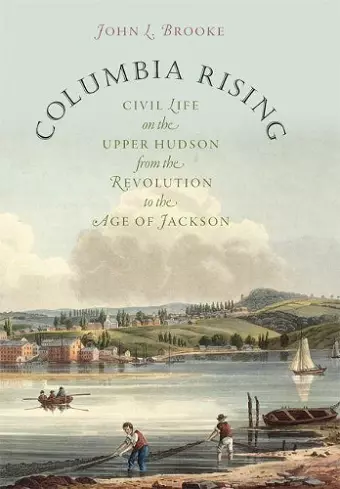Columbia Rising
Civil Life on the Upper Hudson from the Revolution to the Age of Jackson
Format:Paperback
Publisher:The University of North Carolina Press
Published:30th Aug '13
Currently unavailable, our supplier has not provided us a restock date

In Columbia Rising , Bancroft Prize-winning historian John Brooke explores the struggle within the young American nation over the extension of social and political rights after the Revolution. By closely examining the formation and interplay of political structures and civil institutions in the upper Hudson Valley, Brooke traces the debates over who should fall within and outside of the legally protected category of citizen. The story of Martin Van Buren--kingpin of New York's Jacksonian ""Regency,"" president of the United States, and first theoretician of American party politics--threads the narrative, since his views profoundly influenced American understandings of consent and civil society and led to the birth of the American party system. Brooke masterfully imbues local history with national significance, and his analysis of the revolutionary settlement as a dynamic and unstable compromise over the balance of power offers an ideal window on a local struggle that mirrored the nationwide effort to define American citizenship. |Brooke explores the struggle within the young American nation over the extension of social and political rights after the Revolution. By closely examining the formation and interplay of political structures and civil institutions in the upper Hudson Valley, Brooke traces the debates over who should fall within and outside of the legally protected category of citizen. The story of Martin Van Buren threads the narrative, since his views profoundly influenced American understandings of consent and civil society and led to the birth of the American party system. Brooke's analysis of the revolutionary settlement as a dynamic and unstable compromise over the balance of power offers a window to a local struggle that mirrored the nationwide effort to define American citizenship.
A masterful work. . . . Brooke's research is impressive."--Journal of the North Carolina Association of Historians|"Through their impeccable scholarship, Levine and Wilson effectively locate Whitfield as a significant figure. . . . A valuable resource for engaging with and rethinking nineteenth-century African American literary thought in order to include James M. Whitfield."--Resources for American Literary Study
|"This is a work sure to provoke a reexamination of the early republic's notions of citizenship, consent, and social membership, and the legacy of the American Revolution."--Journal of American History
|"A welcome contribution to the cultural history of the early American republic."--Essays In History
|"Inspiring . . . . Brooke's book will hopefully provide a framework for future scholars to test as they seek to understand the process by which Americans moved from the crisis of Revolution to the establishment of a relatively stable political system."--Common-Place
|"Brooke's magisterial command of the lives of a host of characters, some obscure and others not so obscure, makes for compelling reading."--William and Mary Quarterly
|"An important contribution to our ongoing effort to understand nation-building at the turn of the eighteenth century. It offers crucial lessons for the present as well."--American Historical Review
|"This grand work peels back the layers of the troubled and very long 'Revolutionary settlement' in New York's Columbia County. . . . Brooke has made the opaque brilliant and, in the process, highlighted useful interpretive frameworks for scholars of early America. . . . Essential."--Choice
|"In remarkable detail, Brooke mines the archives to balance his portrait between the perspectives of the wealthy landowners . . . and the disenfranchised. . . . Will be valuable to students of history and political theory and others interested in America's early days."--Library Journal
ISBN: 9781469609737
Dimensions: unknown
Weight: 932g
648 pages
New edition